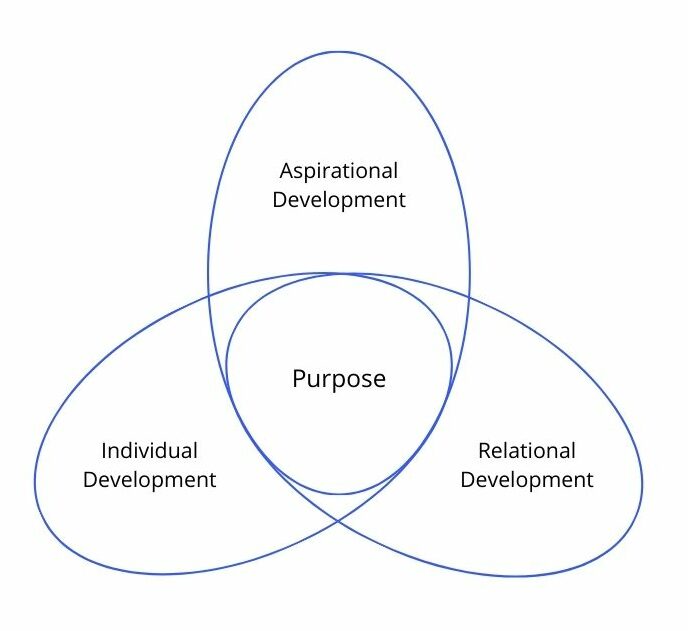Thriving is living life on purpose.
I have come that they may have life, and have it to the full. (John 10:10b)
Psychology and theology come together to provide a vision for the good life.
What is the fuss about thriving? From Kaiser Permanente to Petco, everyone uses the word. It’s an appealing idea, the idea of vigorous growth, positivity, and well-being. Who doesn’t want to thrive? Who doesn’t want their children to become all they can be? The word thriving is so common-place that it almost feels trivial to talk about it. And yet, we wonder about what it means to truly thrive in the face of difficulties? Is a vision of human thriving an accurate reflection of what God wants for us? What did Jesus mean when he offered us the fullness of life? How do we at the Thrive Center understand what it means for people to thrive? In short, thriving is living a life on purpose. Thriving involves growing toward telos – toward God’s purposes for us. Before going in depth, it might be helpful to start with some common misconceptions about thriving.
Common Myths About Thriving
Myth 1: Thriving is always about vigorous individual growth.
While thriving involves growth and development, not all growth is good growth. Moreover, continuous vigorous growth is neither realistic nor sustainable. Life involves joys and disappointments; losses and triumphs. While there will be times of vigorous growth in life, thriving is more about intentional growth. In order to thrive we must cultivate practices, become more agile, adapt, and work toward a coherent life, in spite of circumstances.
Myth 2: Thriving is just about our spirituality and faith.
We recognize the goodness of God’s creation. That goodness includes our bodies and our relationships with one another and the natural order. Thriving involves becoming one’s best self – with and for others – while participating in God’s ongoing work in this world.
Myth 3: Thriving is the pursuit of happiness.
Pleasant experiences that produce happiness come and go, and with them, so goes the feeling of happiness. Happiness occurs in the moment. While being happy is part of thriving, the pursuit of it is not enough to support thriving. Thriving is more purposeful than that. Joy is an emotion related to happiness, but is more substantial and related to what matters most. Joy carries weight and is tied to meaning and connection. Think of moments of deep spiritual connection, great accomplishment, or reunion with a loved one. Joy directs us toward what matters, and pursuing what matters supports our thriving.
Myth 4: Thriving is about me
Individualism may be rampant in American culture, but individual success is not thriving. Thriving occurs within relationships. Thriving is not about me, it is about “we.” We cannot thrive without others, and contributing to the lives of others and our planet is essential to what it means to thrive. Created in the image of God, we are relational beings, mirroring the relational nature of the Trinity.
Myth 5: Thriving involves performance and success.
Thriving goes beyond performance and success. We lose joy when we focus on performance. Instead, thriving involves pursuing purpose, which involves asking ourselves why we do what we do. Purpose gets us out of the trap of perfectionism. Purpose helps us to pursue meaningful goals, relationships, and values, enabling us to contribute to the greater good.
Myth 6: Thriving means conformity of behavior.
The Christian church has been guilty of focusing on the conformity of behavior – if we behave in certain prescribed ways, we will be good Christians. While Jesus is the example, Christians are called to become more like Christ, but as our unique selves.
Myth 7: Thriving is an endpoint.
Thriving is not an endpoint or destination, but a process of transformation. It means intentional, directional growth that is part of God’s purposes as we engage in His work in the world.
What is thriving?
- Discovering what is meaningful and adapting toward purpose,
- Exploring and applying our passions, strengths, and talents in relationship with others and for the benefit of others,
- Fueled by spirituality and love, and resulting in enduring joy.
A Framework: Discovering our Purpose
Theology and psychology have much to say about telos, or purpose. Discovering what God wants for our lives is a process. The Thrive Center offers a framework for exploration of purpose with our three-part model.

Aspirational
- Christians are called to become like Christ, conforming to the actions and patterns of His example. From a psychological perspective, we know that when our lives align with our beliefs, values, and ideals we experience peace and joy, both important for thriving.
- Christians rely on God and the Holy Spirit to become like Christ in order to live into moral and spiritual ideals. Experiencing God’s presence through spiritual practices, transcendence, and mystery help people discern calling and purpose. Slowing the mind through prayer, silence, and meditation open people to awe, wonder, and lament. Profound experiences of beauty, nature, and worship allow us to access transcendent emotions. These experiences and emotions can change the way we see ourselves and the world. They can reorient us and motivate us to greater devotion to our beliefs, callings, and purposes.
Individual
- Although Christians are called to be conformed to the image of Christ, this does not mean we are called to uniformity. A focus on rules and conformity is not helpful for thriving. A thriving life comes in many forms, shapes, paths, and varies across people.
- Central to our personal development is identity formation, and our beliefs help to inform how we see ourselves and our stories. Christian faith offers the powerful story that we are beloved children of God.
- Individual development is strength-based. Thriving people use their strengths and deepest joys and talents to lean into purpose and contribution.
Relational
- The quality of our relationships with God, ourselves, and creation is central to our understanding of what it means to thrive.
- We are created to live in mutual relationships, or in reciprocity, just as God, the Father, lives in reciprocity with Jesus, the Son, and the Holy Spirit. God lives in a dynamic relationship with us.
- We need intimacy and accountability to experience that we are known, loved, and that we matter.
- Thriving involves discovering our purpose in connection to others and contributing to the lives of others.
Summary
- Thriving involves transformation – growing and adapting toward purpose.
- Purpose is found at the intersection of individual, relational, and aspirational development.
- Christians thrive through becoming more like Christ, as unique selves, and in relationship with others.
- Growth, specifically vigorous growth, is usually associated with thriving, but sometimes growth is slow, stuck, or thwarted. Intentional practices, and a thriving mindset, help us become more resilient.
- Thriving involves contribution to others and the world.
- Thriving happens as we clarify and pursue a purpose that is aligned with our strengths, our life-giving relationships, and our values.
- Thriving involves living a life of love, and results in enduring joy.
Want to dive deeper? Consider taking our course.
Start Learning
Continue Exploring

Thriving
An Invitation to Thrive
Dr. Pamela King invites leaders to reimagine and lead in new ways in order to enable all people and communities to thrive.

Blog
Installation Address: An Invitation to Thrive
In her installation address, Pamela King speaks on thriving as an invitation to embrace our purpose in God's ongoing story.

Emotions
Staying Grounded, Connected, and Directed
Dr. Pam King discusses how spirituality can help us stay grounded, connected, and directed throughout difficult challenges.

